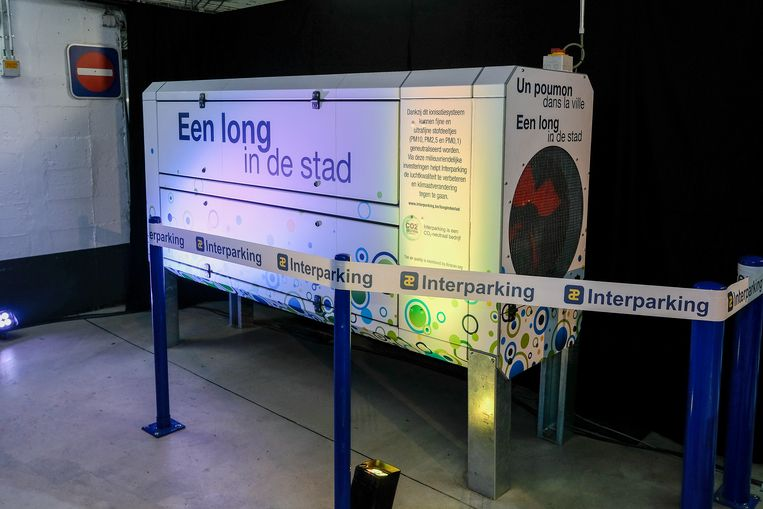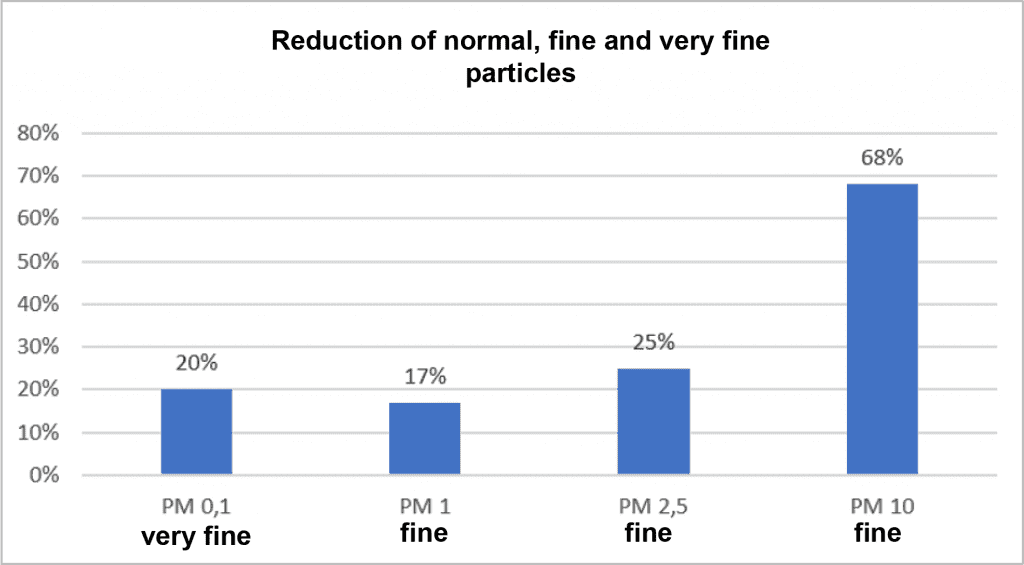A premiere in Brussels: "The lungs in the city"
Parking ‘2 Portes’ in Brussels is the first representative of a new generation of car parks. It was recently equipped with a new system for neutralising fine particles that purifies the ambient air and makes it less harmful to health. Parking 2 Portes will thus become a real lung in the city.

Fine dust particles are harmful to the health of people exposed to them. They are invisible to the naked eye, but can be inhaled and eventually cause respiratory and cardiovascular diseases.
To remedy this situation and to ‘purify the air’ in its car parks, Interparking is introducing an innovative system that neutralises up to 70% of particles, up to 40% of fine particles and up to 20% of ultra-fine particles in Parking 2 Portes in Brussels. Developed by ENS Clean Air in cooperation with the University of Maastricht in the Netherlands, this technology uses the positive ionisation process to retain fine particles in the ambient air. The effectiveness of the system inside the parking has been validated by the independent air quality monitoring company Airscan.org. Interparking thus aims to reduce its ecological footprint and that of its customers while striving for an environmentally friendly mobility mix adapted to the mobility needs of the inhabitants of Brussels. Interparking is convinced that the solution to environmental problems has to be based on constructive cooperation between companies, local authorities and citizens. The principle is very simple. In a first phase, the polluted air is sucked into a system that gives the fine dust particles a positive electrical charge. The particles then bind together to form larger particles. These larger particles then move towards a collector plate which immobilises them and converts them into coarse dust. Stripped of the polluting particles, the purified air is finally blown out of the system.
Once converted to coarse dust, the particles can no longer be transported into the air or inhaled and are collected for destruction in a specialized centre.
“Interparking meets the challenges of social and environmental responsibility in many ways,” Roland Cracco, CEO of Interparking underscores. “We believe that a positive impact on society and the environment is part of our mission”.
About Interparking
The Brussels-based company Interparking (www.interparking.be) is one of the leading operators of parking facilities in Europe. Based on 60 years of experience in major European cities, Interparking’s strategy is applicable both to urban development and to the management of our parking network. It is based on three pillars: continuous improvement of the quality of our services; innovative mobility solutions that meet the challenges of cities; a responsible policy that helps to protect the environment. Interparking is currently present in 9 countries and more than 390 cities in Europe (in Belgium, Germany, the Netherlands, France, Spain, Poland, Austria, Italy and Romania), with more than 2,500 employees and around 930 sites in its portfolio.
Since 2015 Interparking has been certified CO2-neutral in all countries where the company is active. In 2018, Interparking also signed the first “Green Loan” in Belgium with BNP Paribas Fortis, a loan whose interest rate is linked to performance and the achievement of sustainability objectives such as the reduction of the carbon footprint per full-time equivalent and the reduction of energy consumption.
About Airscan
Airscan.org is an independent air quality measurement, monitoring and warning company. Its expertise and technology (developed by CNRS) enables companies and government agencies to measure indoor and outdoor pollution for better air quality decisions. The most commonly measured pollutants are PM10, PM2.5, VOC, NO2, CO2, formaldehyde, trichloramine, radon, O3… Airscan.org is a sister company of CO2logic.

Graph 1: Reduction of fine and extremely fine particles by the ENS system (Source: ENS Clean Air).
Technical data provided by ENS Clean Air. The measurements of PM 2.5 particles carried out by Airscan.org in Parking 2 Portes are between 44% and 50% lower.

Graph 2: Histogram PM2.5 concentrations in Parking 2 Portes before and after the installation of the ENS system, and in the city (Source: Airscan.org).
Example of the positive effects of the ENS Clean Air system on PM2.5 particles. The ENS Clean Air system can improve the air quality in a car park significantly. After treatment, the air inside Parking 2 Portes (green bar) is not only healthier than the air inside the car park before treatment (orange bar), but also better than the outside air (blue bar).
For more information on this project:
- Roland Cracco – CEO Interparking +32 2 549 58 16 rcracco@interparking.com
- Nicolas Godon – Marketing & Communication Manager Interparking +32 471 78 02 13 ngodon@interparking.com
- Press – Evelyn Gessler – Decider’s +32 475 23 53 92 evelyn.gessler@deciders.eu
- Jérôme De Waele – Airscan +32 474978399 jerome@airscan.org
Learned something? Feel free to share.

Ozone Levels In Brussels For The Last 10 Years
Did you know that the very air we breathe can be both a shield and a hazard? While ozone high up in the atmosphere protects us from the sun’s harmful rays, ground-level ozone can pose serious health risks. Airscan’s latest decade-long study reveals alarming trends in ozone levels across Brussels, with certain summer days seeing concentrations double the WHO’s recommended limit. Dive into our findings to understand how ozone impacts your environment and discover practical tips to protect yourself during high-pollution days..

Pure Cities: how temperature, wind and rain shape our air
This article explores the seasonal variations in air pollution and the influence of meteorological factors on pollutant concentrations, focusing on data from the “Pure Cities” project in Belgium. Analyzing pollutants like PM2.5, PM10, and NO2, the study highlights how temperature, humidity, wind speed, atmospheric pressure, and precipitation affect air quality throughout the year. Findings show that pollutant levels tend to rise during colder months due to increased residential heating and reduced dispersion. The article discusses the importance of addressing seasonal pollution through targeted strategies, such as enhancing public transport, promoting green spaces, and aligning regulations with WHO guidelines.

Beats for Planet: Key Findings of 3 Years of Air Quality Monitoring in Belgian Schools
3 Years of Beats for Planet: this is what we know about air quality in Belgian schools! If you have been following Airscan for a while, you will definitely know Beats for Planet. Airscan launched this project with Belfius three years ago with the aim of helping schools improve their air quality. In the framework of this project, Airscan has collected and analyzed data from 72 schools around Belgium for three indoor pollutants: carbon dioxide (CO2), particulate matter (PM) and volatile organic compounds (VOC). This is what we found..





